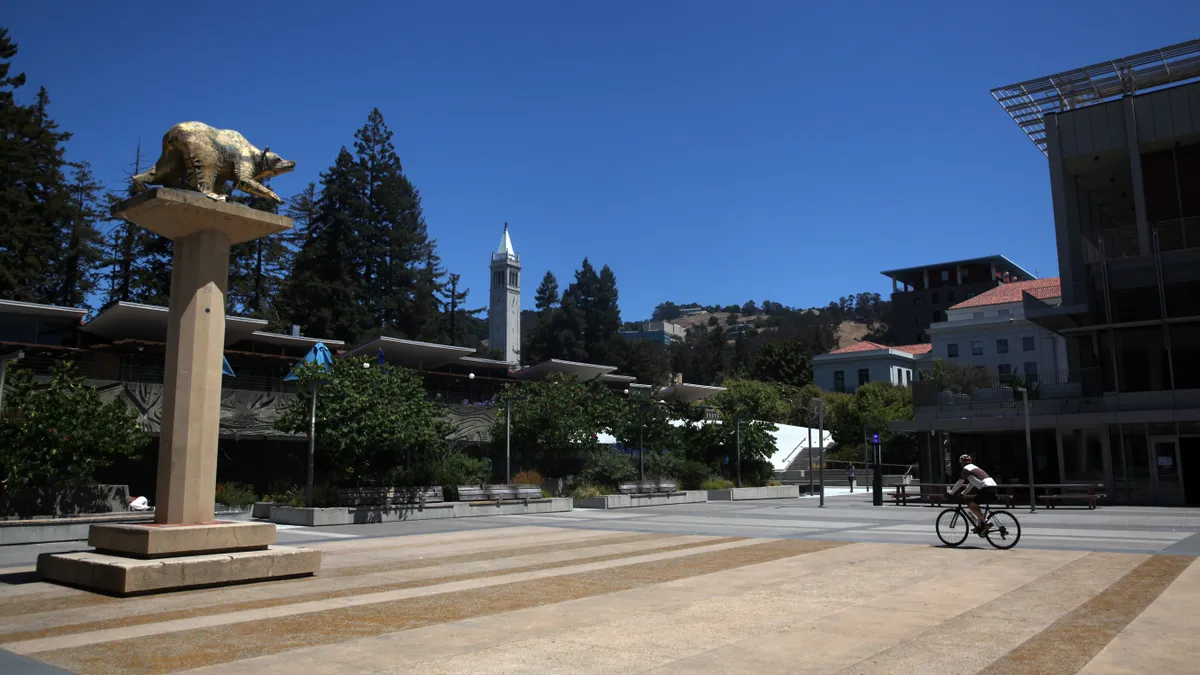Dive Brief:
- The University of California, Berkeley, will no longer need to follow a court-ordered enrollment cap on its fall 2022 class after Gov. Gavin Newsom on Monday night signed legislation effectively undoing the decision.
- The bill amends a controversial California environmental protection law cited in a lawsuit against UC Berkeley that argued an influx of new students stressed area housing and public services.
- A state Superior Court judge last year froze the university's enrollment at 2020-21 levels, and the California Supreme Court kept that order in place this month. Legislators fast-tracked the bill as UC Berkeley prepared contingency actions under which it planned to enroll 2,600 fewer students on its main campus this fall than originally expected. Most affected students would have enrolled online, later in the year or on other campuses, but 400 students in mostly graduate programs would have been cut from enrollment altogether.
Dive Insight:
The bill raced through the legislative process, passing each chamber of the Legislature unanimously on Monday, reflecting policymakers' aversion to an enrollment ceiling for UC Berkeley.
Residents' advocacy group Save Berkeley’s Neighborhoods had sued the university in 2019, alleging it ran afoul of the California Environmental Quality Act, which is a state law often referenced to oppose new development.
Siding with the organization, last year Alameda County Superior Court Judge Brad Seligman directed UC Berkeley to curtail enrollment until it assessed how student growth would affect local housing, noise levels and services.
But the judge's order was widely unpopular among state leaders, with Newsom urging California's high court to overturn it before the court issued its ruling early this month.
Initially, UC Berkeley said it would need to reduce its fall class by about 3,000 students in light of the order, but the university later lowered those projections, estimating only 400 students, mostly in graduate programs, would be cut.
Officials planned to reduce total undergraduate and graduate enrollment from about 45,000 in the most recent fall to 2020's level of 42,327, in part by enrolling some 1,000 students in online courses and having about 650 delay attendance. UC Berkeley is scrapping those plans and in late March will "extend admissions offers to more than 15,000 incoming freshman and then to more than 4,500 transfers in mid-April," spokesperson Dan Mogulof said in a statement.
The legislative changes passed Monday alter the California environmental law so that student enrollment doesn't solely determine an institution's impact.
Instead, the law will gauge campus population, including employees, which would stop future litigation specifically targeting student enrollment.
The new law also prevents courts from immediately ordering an enrollment cap if a campus' population exceeds a development plan. It instead allows institutions 18 months to certify a court-ordered environmental impact report before a judge can impose an enrollment freeze.
State Sen. Nancy Skinner, who represents the area where the UC Berkeley campus is located, praised the legislative fix.
"It was never the intent of the Legislature for students to be viewed as environmental pollutants," Skinner said in a statement. "This legislative agreement ensures that California environmental law does not treat student enrollment differently than any other component contained in our UC, CSU or Community College long-range development plans."
Save Berkeley’s Neighborhoods, meanwhile, in a statement prior to Newsom signing the bill called it "poorly drafted and confusing." The group said it expected the law to result in more litigation, "and without the legislature imposing a legally binding requirement for UC to build housing before increasing enrollment, the housing crisis will get worse."














